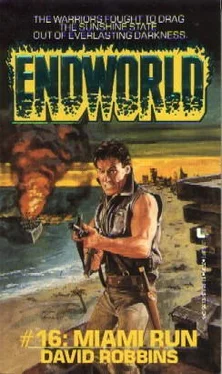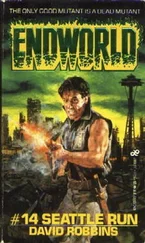David Robbins - Miami Run
Здесь есть возможность читать онлайн «David Robbins - Miami Run» весь текст электронной книги совершенно бесплатно (целиком полную версию без сокращений). В некоторых случаях можно слушать аудио, скачать через торрент в формате fb2 и присутствует краткое содержание. Город: New York, Год выпуска: 1989, ISBN: 1989, Издательство: Leisure Books, Жанр: sf_postapocalyptic, Боевая фантастика, на английском языке. Описание произведения, (предисловие) а так же отзывы посетителей доступны на портале библиотеки ЛибКат.
- Название:Miami Run
- Автор:
- Издательство:Leisure Books
- Жанр:
- Год:1989
- Город:New York
- ISBN:978-0843927863
- Рейтинг книги:5 / 5. Голосов: 1
-
Избранное:Добавить в избранное
- Отзывы:
-
Ваша оценка:
- 100
- 1
- 2
- 3
- 4
- 5
Miami Run: краткое содержание, описание и аннотация
Предлагаем к чтению аннотацию, описание, краткое содержание или предисловие (зависит от того, что написал сам автор книги «Miami Run»). Если вы не нашли необходимую информацию о книге — напишите в комментариях, мы постараемся отыскать её.
Miami Run — читать онлайн бесплатно полную книгу (весь текст) целиком
Ниже представлен текст книги, разбитый по страницам. Система сохранения места последней прочитанной страницы, позволяет с удобством читать онлайн бесплатно книгу «Miami Run», без необходимости каждый раз заново искать на чём Вы остановились. Поставьте закладку, и сможете в любой момент перейти на страницу, на которой закончили чтение.
Интервал:
Закладка:
“What the heck!” Hickok abruptly exclaimed, slamming on the brakes.
Blade looked ahead.
Not 15 yards away, vividly revealed by the car’s headlights, was an enormous alligator crossing the road. The reptile lumbered from left to right, ignoring the vehicle.
“Where the blazes did that critter come from?” Hickok asked.
“Ever hear of the Everglades?” Barbish responded.
Blade thought of the century-old map. “Aren’t the Everglades southwest of here?”
“You’re thinking of the Everglades National Park, as it was once known,” Barbish said. “The Park covered a million and half acres on the southwest tip of the peninsula. But the Park was a small part of the total Everglades. You’re on the eastern edge of the Everglades right now. Five thousand square miles of swamp. Nothing but water, gators, and snakes for miles and miles and miles.”
“Snakes?” Hickok said.
Blade watched the alligator disappear in the brush on the right side of the road. “Let’s go?”
“Snakes?” Hickok said again, driving forward.
“The Everglades are a haven for snakes,” Barbish elaborated. “Swamp snakes, brown snakes, ribbon snakes, garter snakes. And they’re the harmless ones. Poisonous varieties abound in the Everglades. There are the coral snakes, the cottonmouths, and the rattlers, of course, as well as the exotic types, like the cobras.”
“Who are you tryin’ to kid?” Hickok demanded. “Cobras live in India and Africa, not Florida.”
“That was true once,” Barbish said. “But not anymore. You see, a lot of people imported exotic species into Florida before the war. Cobras.
Piranhas. Others. And some escaped or were deliberately let loose by their owners. The climate in Florida was ideal for breeding. The cobras and piranhas multiplied, despite the best efforts of the authorities to eradicate them. Don’t believe me if you want, but I assure you that there are cobras in the Everglades. One of Arlo’s men was bitten by a cobra a few years ago.”
“What happened to him?” Hickok asked.
“What else? He died.”
Blade remembered a schooling class on Florida and voiced a question.
“What about the alligators? There seem to be a lot of them, and yet I read that they were almost exterminated before the war.”
“Not quite true,” Barbish answered. “The alligators made a comeback before World War Three. They were protected by law, and they reproduced so fast that special hunting seasons were set up. After the war, of course, with so few hunters and poachers to reduce their ranks, the gators made like rabbits. Now the damn things are everywhere.”
“I don’t reckon I’ll retire in Florida,” Hickok joked.
“The gators and the snakes aren’t the worst of it,” Barbish went on.
“There are other—things.”
“What kind of things?” Blade queried.
“Mutant things,” Barbish said. “Huge things.” His tone changed, becoming filled with awe. “I saw one once, from the south dock on Arlo’s estate. It was splashing in the swamp, heading from east to west. The moon was out, and we could see it fairly well.”
“What did it look like?” Blade probed.
“How can I describe it?” Barbish responded. “It was like a dinosaur.
Think of an alligator fifty feet long, only with spikes on its back and a head like a frog. It was bizarre.”
The mention of mutants had stimulated Blade’s curiosity. He stared at the Dealer. “And the Masters?”
“What about them?”
“They’re mutants. What do they look like?”
“Only two of the Masters have attended the annual Dealer meetings,” Barbish said. “Orm and Radnor. How can I describe them? Walking nightmares? And,” he emphasized, “they never revealed where their base was.”
“Weren’t you ever curious? Didn’t you ask Arlo questions?”
Barbish snorted. “It’s not healthy to ask too many questions of your superiors in my line of work. Yes, I was curious. Yes, I tried to gather as much information as I could on the sly. But I didn’t learn much.”
“How much?”
The Dealer looked at the giant for a moment. “Perceptive, aren’t you? All right. What harm can it do? I learned there are seven Masters, and they’re all part of the same family.”
“They’re all related?”
“So I was told,” Barbish confirmed. “But I don’t know the specifics.”
“And that was it?”
“Trying to discover more would have cost me my life,” Barbish stated.
“So working for mutant Masters never bothered you?”
“Maybe a little,” Barbish said. “But the benefits outweighed any qualms of conscience.”
“So you sold countless souls into a life of drug addiction to line your own pocket and please the Masters,” Blade commented scornfully.
“We all have to look out for number one.”
Blade frowned. “That’s twice I’ve heard the same stupid statement. It’s so selfish, it’s disgusting. We’re not put on this planet just to look out for number one, just to think of ourselves first all the time. We’re put here to learn to care for others, to learn the meaning of love and sharing—”
Barbish laughed. “Where did you ever hear nonsense like that?”
“Our Elders taught us the importance of possessing fundamental values.”
“Your Elders? Where are you from?”
“Never mind.”
“Your philosophy on life is all backwards,” Barbish commented. “It’s a dog-eat-dog world. Only the strong survive, by any means necessary. If you want something out of life, you have to take it. Love is an illusion. Power is what counts. Power and wealth. And by rising through the ranks of the Dragons, by becoming a Dealer for the Powder of Life, I’m living proof of what I say.”
“What is the Powder of Life?” Blade asked.
“Cocaine. The Masters refer to coke as the Powder of Life. They like the Dealers to encourage the pushers to push coke over the other drugs,” Barbish replied.
“Why?”
“The profit potential is greater, for one thing,” Barbish said. “Smaller quantities bring bigger profits. Coke is easy to handle, easy to measure and packet. Plus the addiction factor is incredible.”
“The addiction factor?”
“Yes. The addiction factor is a primary concern for every Dealer and pusher. If we want to maximize our profits, to increase our pool of repeat customers, we must get them hooked on the hard stuff. Coke is ideal. It has fewer side effects than, say, heroin, and it gives a high like you wouldn’t believe. Coke is the mainstay of the Dragons’ business.”
“Where do the Masters obtain their coke?”
“I was never told,” Barbish said. “I suspect they get it from a cartel in South America. I accidentally saw some vouchers once dealing with planeloads of dope coming down the pipeline from Colombia.”
“Someone should have put the Dragons out of business a long time ago,” Blade remarked.
Barbish snickered. “Like who, young man? The police? They are paid by the Dragons. They’re in our employ. The same with the politicos. The people think they get a real choice at election time, but every candidate is on the Dragon payroll. We allow elections for mayor and council seats to give the citizens the illusion of freedom. But it’s all a farce, and the people are too stupid to realize it.”
“Are they stupid, or drugged out of their minds?” Blade asked. “Their entire perception of reality is off.”
“No one forces them to use our products.”
“Products? Don’t you mean poisons?”
“Call it whatever you want.”
“Someday, someone will come down here and mop up the Dragons,” Blade predicted.
“Never happen,” Barbish responded.
They drove in silence for over five minutes.
Читать дальшеИнтервал:
Закладка:
Похожие книги на «Miami Run»
Представляем Вашему вниманию похожие книги на «Miami Run» списком для выбора. Мы отобрали схожую по названию и смыслу литературу в надежде предоставить читателям больше вариантов отыскать новые, интересные, ещё непрочитанные произведения.
Обсуждение, отзывы о книге «Miami Run» и просто собственные мнения читателей. Оставьте ваши комментарии, напишите, что Вы думаете о произведении, его смысле или главных героях. Укажите что конкретно понравилось, а что нет, и почему Вы так считаете.












